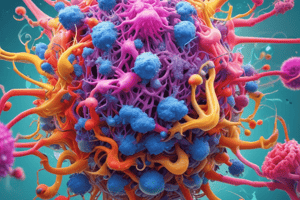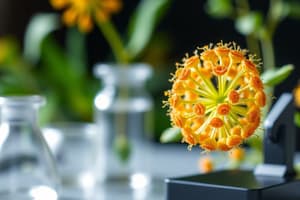Podcast
Questions and Answers
Which theme in biology describes how structure relates to its function?
Which theme in biology describes how structure relates to its function?
- Energy transformations
- Interconnections within systems
- Structure-Function relationship (correct)
- Information flow
What is the core theme that unifies all of biology?
What is the core theme that unifies all of biology?
- Energy transformations
- Interconnections within systems
- Evolution by natural selection (correct)
- Information flow
Which theme explains how life functions through the transmission of genetic information?
Which theme explains how life functions through the transmission of genetic information?
- Structure-Function relationship
- Evolution
- Information flow (correct)
- Energy transformations
What theme in biology involves the study of interactions between various components across different scales?
What theme in biology involves the study of interactions between various components across different scales?
Which of the following best describes the concept of energy transformations in biology?
Which of the following best describes the concept of energy transformations in biology?
What is the primary focus of biology as a scientific discipline?
What is the primary focus of biology as a scientific discipline?
Which approach to science involves collecting data through verifiable observations?
Which approach to science involves collecting data through verifiable observations?
What best describes a hypothesis in scientific inquiry?
What best describes a hypothesis in scientific inquiry?
Which is NOT a characteristic of the scientific method?
Which is NOT a characteristic of the scientific method?
Which statement can be considered a scientific hypothesis?
Which statement can be considered a scientific hypothesis?
What role does a hypothesis play in hypothesis-driven science?
What role does a hypothesis play in hypothesis-driven science?
In the context of the scientific method, what does it mean for a statement to be falsifiable?
In the context of the scientific method, what does it mean for a statement to be falsifiable?
What is the potential outcome of revising a hypothesis during an experiment?
What is the potential outcome of revising a hypothesis during an experiment?
What is the primary role of the cell wall in a eukaryotic cell?
What is the primary role of the cell wall in a eukaryotic cell?
Which of the following organelles is exclusively found in animal cells?
Which of the following organelles is exclusively found in animal cells?
What is the function of flagella in prokaryotic cells?
What is the function of flagella in prokaryotic cells?
What distinguishes chloroplasts from other organelles?
What distinguishes chloroplasts from other organelles?
Which component of a prokaryotic cell helps it escape engulfment by phagocytic cells?
Which component of a prokaryotic cell helps it escape engulfment by phagocytic cells?
The cytoplasm in a eukaryotic cell includes which of the following?
The cytoplasm in a eukaryotic cell includes which of the following?
What is the main difference in the structure of prokaryotic and eukaryotic cells?
What is the main difference in the structure of prokaryotic and eukaryotic cells?
Which structure serves as the control center of eukaryotic cells?
Which structure serves as the control center of eukaryotic cells?
What does cell theory state?
What does cell theory state?
Which category of cells lacks a nucleus?
Which category of cells lacks a nucleus?
Which of the following are types of eukaryotic cells?
Which of the following are types of eukaryotic cells?
What are ribosomes primarily responsible for?
What are ribosomes primarily responsible for?
What structure is considered the most important organelle in eukaryotic cells?
What structure is considered the most important organelle in eukaryotic cells?
How do prokaryotic and eukaryotic cells primarily differ?
How do prokaryotic and eukaryotic cells primarily differ?
Which of the following statements is true regarding cell division?
Which of the following statements is true regarding cell division?
Which of these is NOT a feature of all cells?
Which of these is NOT a feature of all cells?
Which organelle is responsible for protein synthesis in both animal and plant cells?
Which organelle is responsible for protein synthesis in both animal and plant cells?
What is the primary function of the central vacuole in plant cells?
What is the primary function of the central vacuole in plant cells?
Which structure is absent in most animal cells, but present in plant cells?
Which structure is absent in most animal cells, but present in plant cells?
What role do lysosomes play within animal cells?
What role do lysosomes play within animal cells?
Which component is part of the cytoskeleton in both plant and animal cells?
Which component is part of the cytoskeleton in both plant and animal cells?
Which of the following is the site of energy production in both animal and plant cells?
Which of the following is the site of energy production in both animal and plant cells?
Which organelle is primarily involved in modifying, sorting, and packaging proteins?
Which organelle is primarily involved in modifying, sorting, and packaging proteins?
What is a distinguishing feature of chloroplasts in plant cells?
What is a distinguishing feature of chloroplasts in plant cells?
Which type of endoplasmic reticulum is involved in the synthesis of lipids?
Which type of endoplasmic reticulum is involved in the synthesis of lipids?
Which structure serves as the selectively permeable barrier that surrounds the cell?
Which structure serves as the selectively permeable barrier that surrounds the cell?
Study Notes
Introduction to Biology
- Biology is the scientific study of life, exploring inquiry, analysis, and survey methodologies to understand the natural world.
Scientific Approaches
- Discovery Science relies on verifiable observations and measurements, emphasizing data collection (e.g., Darwin’s research in South America).
- Hypothesis-driven Science involves formulating and testing hypotheses derived from observations to explain natural phenomena.
Hypothesis
- A hypothesis is a tentative answer to a question, offering unverified insights into natural events that can be tested for validity.
The Scientific Method
- Consists of a series of flexible steps guiding scientific investigations; hypotheses can be revised or rejected based on experimental outcomes.
Major Themes in Biology
- Evolution through natural selection is the unifying theme of all biological sciences.
- The structure-function relationship highlights correlations at all biological levels (e.g., lung structure and gas exchange).
- Information flow is crucial for life functions, encompassing genetic transmission and inter-cellular communication.
- Energy transformations are essential for sustaining life, converting energy from one form to another.
- Biological systems are interconnected, ranging from microscopic cells to global ecosystems, culminating in the biosphere, where all life exists.
Cell Theory
- All living organisms consist of cells, which arise from prior living cells.
Cell Types
- Prokaryotic cells (e.g., Bacteria and Archaea):
- Older, simpler in structure, lack a nucleus, and have coiled DNA in a region called the nucleoid.
- Eukaryotic cells (e.g., Protists, Plants, Fungi, Animals):
- Larger and more complex, contain a nucleus and organelles with specific functions.
Components of Prokaryotic Cells
- Have a rigid cell wall providing shape and protection.
- Plasma membrane encloses the cytoplasm, which contains cytosol and cellular components.
- Ribosomes present for protein synthesis.
- Structures include pili for adhesion, flagella for movement, and capsules for escape from immune responses.
Comparison of Eukaryotic Cells
- Cytoplasm of eukaryotic cells contains various organelles.
- Animal and plant cells share most organelles but differ in some:
- Plant cells contain chloroplasts for photosynthesis.
- Animal cells have lysosomes for digestion.
- Key organelles include the nucleus (houses genetic material), mitochondria (energy production), and endoplasmic reticulum (protein synthesis and transport).
Organelles in Eukaryotic Cells
- Ribosomes synthesize proteins.
- Mitochondria are the powerhouse of the cell.
- Endoplasmic reticulum (rough and smooth types) participates in protein and lipid synthesis.
- Golgi apparatus modifies and packages proteins for secretion.
Studying That Suits You
Use AI to generate personalized quizzes and flashcards to suit your learning preferences.
Related Documents
Description
Explore the foundational concepts of biology as outlined in Chapters 1 and 4. This quiz covers the scientific study of life, emphasizing inquiry, analysis, and the importance of verifiable observations. Test your understanding of key biological principles and the methods used in biological research.




